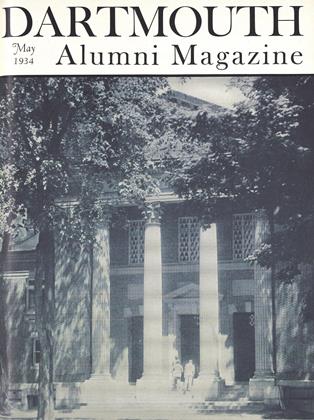A second "No Quota" year for the Alumni Fund was inaugurated with the mailing of the Fund Committee's opening announcement of April 16 to 15,000 Dartmouth alumni. During the economic stress of last year, President Hopkins urged the Fund Committee to restrain the urgency upon alumni instead of appealing for increased assistance ,to the College. This year the President recommended the continuance of the policy for a second Fund campaign, and the Alumni Fund for 1934 was opened on this basis by the Committee in its mailing piece to the alumni entitled "No Quota Again." This will be the only mailing from the Fund Committee to the alumni with the exception of a reminder before the campaign closes June 30.
More class agents than ever before attended the Alumni Fund meetings in Boston, New York, and Chicago to draft the plans for the compaign, and the Fund Committee's opening announcement carried the names of a larger corps of agents than ever before. To these class agents will be delegated the entire responsibility for the campaign, and they will appeal to their classes for a high percentage of participation without emphasis on amount of contributions. They will specifically campaign for replies, at least, from every classmate.
An unusually varied body of campaign material will be available this year with charts prepared by the Fund Committee and novel mailings contrived by the class agents. "Dr. Seuss" (T. S. Geisel '25) has drawn some Alumni Fund cartoons for the use of class agents in introducing the lighter touch into some of their mailings.
John C. Sterling '11, chairman of the Fund Committee, called particular attention at the Alumni Fund dinners to the achievements of some of the large young classes in obtaining a high percentage of participation, comparing very favorably with the records of older classes which had been believed to be more unified and have more class spirit.
Attention was also called to the Con- tinued decrease in Alumni Fund expenses for the past three years. It was specially noted that last year's campaign expenses were substantially decreased over the year before, and that even the expenses of the class agents, who carried the burden of the campaign more than during the year before or any time during the past, was slightly decreased as against the expenses in 1933.
The Alumni Fund headquarters reported that even before the Fund campaign had opened officially with the announcement of April 16, $6,000 had been received, including one gift of $2,000 and one of $1,000. The class agent of one class, which operates on a special all-year plan, anmouced nounced that the returns from his men had been 15 per cent higher than during the previous year.
The Fund Committee and the class agents planned definitely to follow through all the way on the "no quota" basis, but many of those associated in the Fund work expressed the hope individually that improved conditions will be reflected in the Alumni Fund to the extent of 20 per cent or more improvement in the total contributions. If this should prove true the Alumni Fund would be not only sufficient to prevent the College incurring a deficit from its year's operations, but might also pay off a portion of the §43,000 deficit carried over from last year.
Elected to Council Luther S. Oakes '99 of Minneapolis chosen by the alumni of District IV to succeed Paul W. Loudon 'l4 as their representative on the Alumni Council.
 View Full Issue
View Full Issue
More From This Issue
-
 Article
ArticleHANOVER BROWSING
May 1934 By Rees H. Bwen -
 Class Notes
Class NotesClass of 1910
May 1934 By Hanrold P. Hinman -
 Class Notes
Class NotesClass of 1918
May 1934 By Allan C. Gottschaldt -
 Class Notes
Class NotesClass of 1905
May 1934 By Arthur E. McClary -
 Class Notes
Class NotesClass of 1933
May 1934 By John S. Monagan -
 Class Notes
Class NotesClass of 1929
May 1934 By F. William Andres
Article
-
 Article
ArticleTHE UNDERGRADUATE CHAIR
APRIL, 1927 -
 Article
ArticleThe Boston Week-End
JANUARY 1932 -
 Article
ArticlePike Estate
December 1932 -
 Article
ArticleSoccer
October 1954 By CLIFF JORDAN '45 -
 Article
ArticleOldest Member of '79 Reminisces
February 1937 By CLIFFORD H. SMITH '79 -
 Article
ArticleMinding the Public's Business
JUNE 2000 By President James Wright

